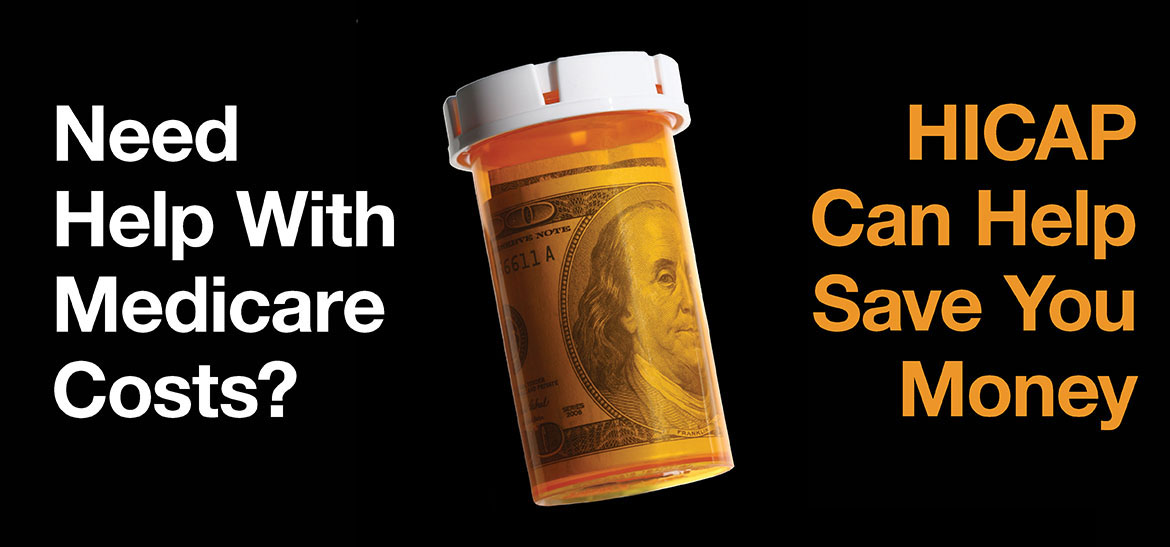
HICAP is here to help.
Medicare can be expensive, and many beneficiaries need assistance paying for prescription drug related costs, or help with paying their Medicare premiums, co-payments, and co-insurance.
Federal, state and other programs can help you with your Medicare related costs. “Extra Help” is a prescription drug assistance program that can help you save money on plan premiums, deductibles and co-payments. “Medicare Savings Programs” can help pay for your Medicare Part A and B premium and some or all of your Medicare deductibles and co-payments.
The Health Insurance Counseling & Advocacy Program (HICAP) provides free, unbiased Medicare counseling to Medicare beneficiaries and their families and can help you apply for these programs.
What are Medicare Savings Programs?
Medicare Savings Programs help people with limited income by paying their Medicare Part A and B premium. These programs may also pay some or all of the Medicare deductibles and co-payments. You may qualify if your income meets eligibility criteria.
Medicare Savings Programs (MSP) are administered by County Social Services. Some beneficiaries may qualify for both Medicare Savings Programs and Medi-Cal, and others may qualify for one but not the other.
Who is eligible?
You must be eligible for Medicare in order to be eligible for any MSP. And, you must meet the income limitations displayed on the MSP Chart below.
If you qualify for QMB, SLMB or QI, you automatically qualify for Extra Help (Low Income Subsidy – LIS), which helps pay for Medicare prescription drug related costs such as plan premiums, deductibles and co-payments.
Qualified Disabled Working Individual (QDWI) Program is available to you if you are disabled, under age 65, and lost your premium-free Part A when you returned to work.
Eligibility is generally re-determined each year.
2025 MSP Summary Chart
| Program Name | Benefits | Monthly Income Single/Married |
|---|---|---|
| Qualified Medicare Beneficiary (QMB) |
|
$1,325 / $1,783 |
| Specified Low-Income Medicare Beneficiary (SLMB) |
|
$1,586 / $2,136 |
| Qualifying Individual (QI) |
|
$1,782 / $2,401 |
| Qualified Working Disabled Individual (QDWI) |
|
$5,305 / $7,137 |
MSP Benefits and Protections
What is Extra Help (Low Income Subsidy – LIS)?
Extra Help is a prescription drug assistance program for people on Medicare who have limited income and assets. The program helps people pay for Medicare Part D premiums, deductibles, and co-payments.
You may qualify if your income and assets meet the following criteria.
| Full Extra Help Coverage | Income Limit | Asset Limit |
|---|---|---|
| Individual | $1,978 | $17,600 |
| Married Couple | $2,665 | $35,130 |
Who qualifies?
Some people automatically qualify for Extra Help, and others must apply for the program.
You automatically qualify –
Other programs to help Medicare beneficiaries lower their prescription drug costs.
| Patient Assistance Programs (PAPs) | Some pharmaceutical companies offer programs that provide free or low-cost drugs to qualified individuals. |
| Annual Plan Reviews | Review your health plan options for potential cost savings during Medicare Open Enrollment (Oct. 15 – Dec. 7). |
| Generic vs. Brand-name Medications | Speak to your doctor about changing to a generic drug. |
| Mail Order Pharmacy | Check your health plan for mail order pharmacy options that may cost less. |
| Tiering Exception | Formally request your health plan to place a drug on a lower tier, lowering the cost of the drug. |
| CA Prescription Drug Discount Program | Get drugs at Medi-Cal rates plus a 15-cent processing fee at Medi-Cal participating pharmacies. |
| Samples | Speak to your doctor about getting samples if you are temporarily having trouble obtaining the drugs. |
| Waiving Co-Pays | Speak to your pharmacist about a case-specific waiver. |
| Charity Care Program | Ask at the hospital about charity care to help lower your drug costs. |
| Pharmacy Comparisons | Compare your prescription prices at different pharmacies. Although in-network pharmacies should have lower prices, there may be occasions when pharmacies outside the network have lower prices. |
What if My Plan Denies Coverage?
Our Health Insurance Counseling & Advocacy Program (HICAP) counselors can help you understand the reason for the denial and can assist you with filing an appeal.
Your plan may deny coverage if:
Contact HICAP for Application Assistance
(800) 434-0222 or (714) 560-0424
OR
Contact your closest Senior Center to schedule an appointment with a local HICAP Counselor
HICAP does not sell, endorse, or recommend insurance products.
This product is supported by the Administration for Community Living (ACL), U.S. Department of Health and Human Services (HHS) as part of a financial assistance award totaling $287,340 with 100% funding by ACL/HHS. The contents are those of the author and do not necessarily represent the official views of, nor an endorsement, by ACL/HHS, or the U.S. Government.
This product is the result of a project funded by a contract with the California Department of Aging and administered by the Orange County Office on Aging.